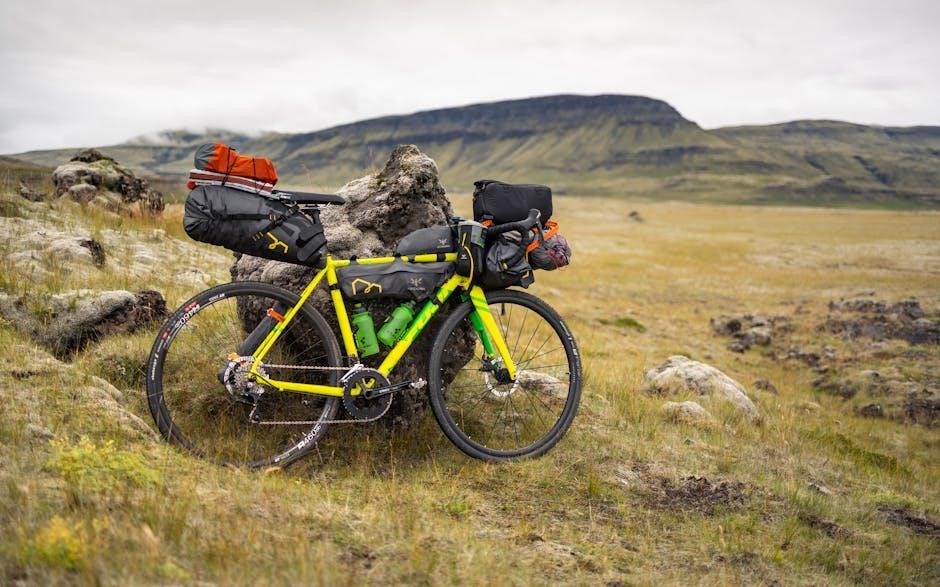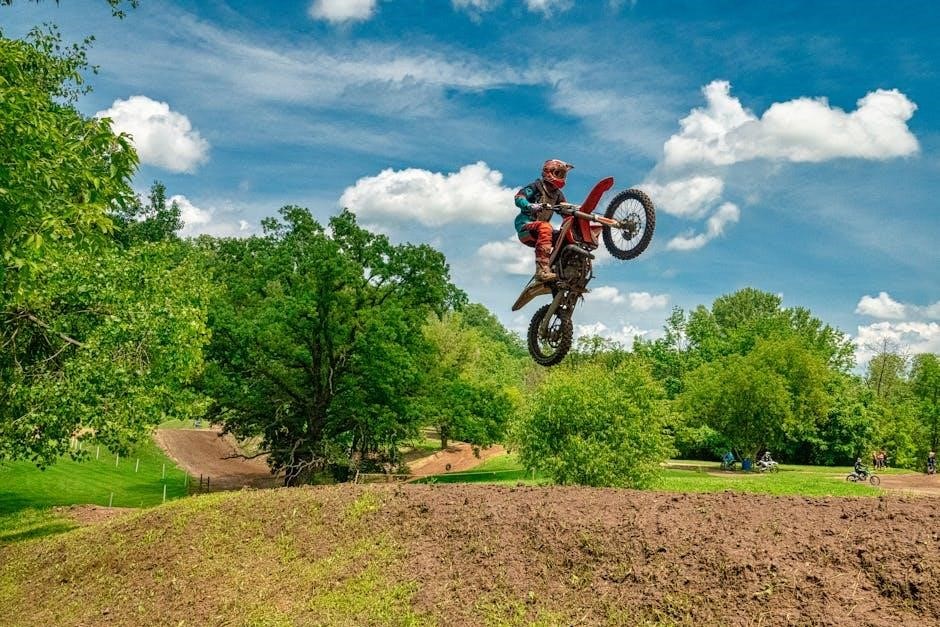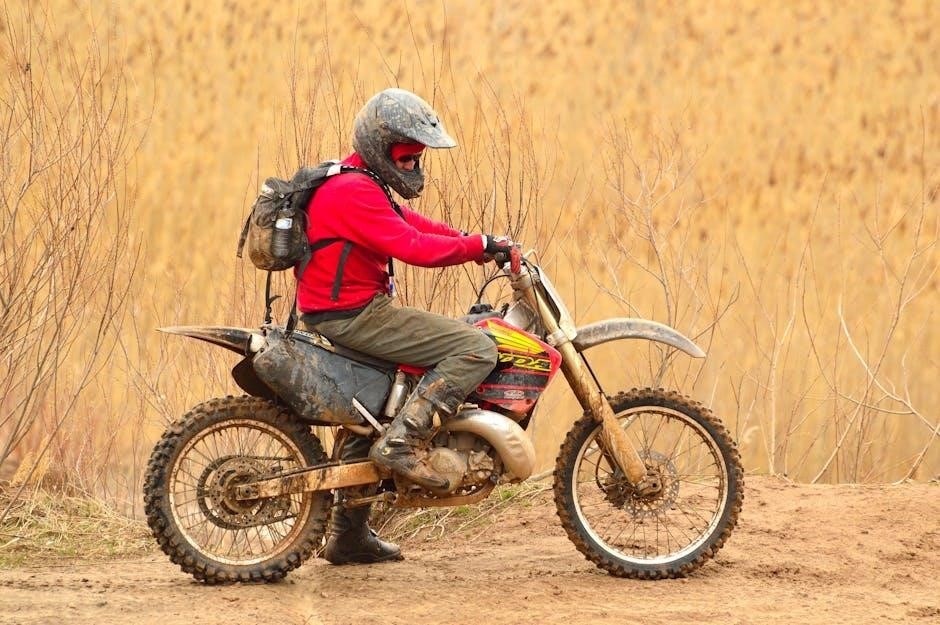Des Moines offers an extensive network of bike trails, with over 68 miles of paved paths and expanding. These trails promote health, tourism, and community engagement, providing scenic routes like Meredith Trail. The Des Moines Bicycle Collective publishes detailed PDF maps, essential for navigating the growing trail system.
1.1 Overview of the Trail System
Des Moines boasts an extensive network of bike trails, spanning over 68 miles of paved paths, with plans to expand by 12 more miles. The system connects urban and natural areas, offering scenic routes like the Meredith and Jordan Creek Trails. These trails are designed to promote recreation, health, and environmental appreciation. The Iowa Natural Heritage Foundation and Des Moines Bicycle Collective play key roles in mapping and maintaining these paths. Regular updates ensure trails remain accessible and well-marked, catering to both locals and tourists. Efforts are ongoing to enhance connectivity and expand trail accessibility, making Des Moines a prime destination for cycling enthusiasts.
1.2 Importance of PDF Guides for Trail Navigation
PDF guides are indispensable for navigating Des Moines’ bike trails, offering detailed maps and essential trail information. These guides, often updated annually, provide clear overviews of trail routes, closures, and points of interest. They are easily accessible online or through local bicycle shops, ensuring cyclists can plan their routes efficiently. The Des Moines Bicycle Collective’s PDF map is particularly popular, highlighting key trails like Meredith and Jordan Creek. These guides are mobile-friendly, allowing cyclists to reference them on the go. Staying informed with the latest PDF versions ensures a smooth and enjoyable cycling experience, making them a vital resource for both locals and visitors.

Popular Bike Trails in Des Moines
Des Moines boasts over 68 miles of paved bike trails, with scenic routes like Meredith and Jordan Creek connecting communities. These well-maintained paths attract casual riders and avid cyclists alike.
2.1 Meredith Trail: A Scenic Route for Cyclists
The Meredith Trail is a beloved route in Des Moines, offering a picturesque journey through the city’s natural landscapes. Known for its well-maintained paths, it connects several parks and green spaces, making it a favorite among both casual riders and serious cyclists. The trail’s scenic beauty, with its tree-lined stretches and waterway views, provides a tranquil escape from urban life. Cyclists can enjoy the trail’s smooth surface and its integration with other routes, allowing for extended rides. Its accessibility and charm make the Meredith Trail a must-visit for anyone exploring Des Moines’ bike trails.
2.2 Jordan Creek Trail: Connecting Communities
The Jordan Creek Trail serves as a vital connector in Des Moines, linking neighborhoods and parks across the city. This trail is a key part of the area’s bike network, offering a seamless route for cyclists to explore diverse communities. Its east-west alignment makes it accessible to a wide range of residents and visitors. The trail’s design emphasizes accessibility, with paved paths and clear signage, ensuring it’s user-friendly for all skill levels. By connecting urban and natural spaces, the Jordan Creek Trail fosters a sense of community and promotes outdoor recreation. It’s a testament to Des Moines’ commitment to creating a connected, bike-friendly environment.
2.3 Bill Riley Trail: A Favorite Among Locals
Bill Riley Trail is a beloved route in Des Moines, offering a serene escape within the city. Nestled in Waterworks Park, it’s a hotspot for both runners and cyclists. The trail’s scenic beauty, especially during fall, draws many to its paths. Locals appreciate its well-maintained surfaces and the way it connects to other trails, creating a network for exploration. While it’s shorter than some other trails, its charm lies in its accessibility and picturesque surroundings. For those seeking a peaceful ride or jog, Bill Riley Trail remains a top choice, reflecting the community’s love for outdoor activities.

Trail Maps and Guides
Des Moines offers detailed trail maps and guides, including PDF versions, to help cyclists navigate its extensive network. The Des Moines Bicycle Collective provides annual updates, ensuring accurate trail information for users.
3.1 The Des Moines Bicycle Collective Map
The Des Moines Bicycle Collective Map is a comprehensive resource for cyclists, detailing over 600 miles of trails. It includes routes, trail conditions, and essential landmarks. Updated annually, this map is accessible in PDF format and printed copies are available at local bike shops. Cyclists can use it to plan rides, explore new trails, and stay informed about maintenance or closures. The map is a vital tool for both locals and visitors, promoting safe and enjoyable biking experiences throughout Des Moines.
3.2 How to Access the PDF Version of the Map
To access the PDF version of the Des Moines Bicycle Collective Map, visit the official website of the Des Moines Bicycle Collective. The map is available for free download and includes detailed trail information, route markings, and updates on trail conditions. Users can navigate to the “Maps” or “Resources” section of the website to find the latest PDF version. The map is updated annually to reflect new trail additions, closures, or improvements. By downloading the PDF, cyclists can easily plan their rides, explore new trails, and stay informed about the ever-expanding Des Moines trail system. This resource is essential for both locals and visitors.
3.3 Key Features of the Trail Maps
The Des Moines Bicycle Collective Map offers detailed trail routes, including scenic paths like Meredith Trail and Jordan Creek Trail. It highlights trail lengths, surface types, and connections between communities. The map includes symbols for parking, rest areas, and water stations, aiding cyclists in planning their rides. Annual updates reflect new trail constructions and closures, ensuring users have the most current information. The PDF version is optimized for printing and mobile devices, making it a versatile resource for both locals and tourists. This comprehensive guide helps cyclists navigate Des Moines’ expanding trail network efficiently and enjoy the city’s outdoor recreational opportunities.

Trail Maintenance and Construction Updates
Des Moines actively updates its trails, with ongoing construction projects like the Great Western Trail closure. Regular maintenance ensures safety and accessibility, supporting outdoor recreation growth.
4.1 Current Construction Projects on the Trails

Des Moines is currently undergoing significant trail improvements, including the temporary closure of the 16.5-mile Great Western Trail for construction. This project aims to enhance trail safety and accessibility. Additionally, a new 3.7-mile trail is being developed in neighborhoods with diverse communities, ensuring inclusivity. These initiatives reflect the city’s commitment to expanding its trail network, with plans to add 12 more miles of paved paths. Construction updates are regularly shared through the Parks and Recreation department, ensuring cyclists stay informed about detours and progress. These efforts are part of a broader vision to create a more connected and bike-friendly city.
4.2 Temporary Closures and Detours
Several Des Moines bike trails are experiencing temporary closures due to ongoing construction and maintenance. The Great Western Trail, a 16.5-mile route, is currently closed for improvements, impacting the bike season. Detours are in place to redirect cyclists around closed sections. Additionally, construction on a new 3.7-mile trail in diverse neighborhoods may cause temporary disruptions. The city provides updates through its Parks and Recreation department, ensuring cyclists are informed about alternate routes. These closures are part of efforts to expand and enhance the trail network, with plans to add 12 more miles of paved paths. Cyclists are encouraged to check for updates before planning their rides.
4.3 How to Stay Informed About Trail Conditions

Cyclists can stay updated on Des Moines trail conditions through various channels. Texting DSMTRAILS to 84483 provides real-time updates from Des Moines Parks and Recreation. The city’s official website and social media platforms also offer detailed information on closures and detours. Additionally, the Des Moines Bicycle Collective regularly updates its PDF trail maps, available for download or purchase at local bike shops. Riders can also join local cycling groups for firsthand information and tips. By utilizing these resources, cyclists can plan their routes efficiently and enjoy a smooth riding experience on Des Moines’ expanding trail network.
Community Involvement and Events
The Des Moines community actively engages in cycling events and group rides, fostering a vibrant trail culture. Local organizations and annual events promote the trail accessibility and enjoyment.
5.1 Local Cycling Groups and Meetups
Local cycling groups in Des Moines organize regular meetups, fostering a sense of community among riders. These groups vary from casual weekend rides to competitive training sessions, catering to all skill levels. Many groups partner with local bike shops and organizations, such as the Des Moines Bicycle Collective, to promote trail awareness and maintenance. Meetups often include guided tours of popular trails like the Meredith and Jordan Creek paths, highlighting scenic routes and hidden gems. These events not only encourage physical activity but also serve as platforms for sharing tips on trail navigation and safety, enhancing the overall cycling experience in the city.
5.2 Annual Events Promoting Trail Usage
Des Moines hosts several annual events to promote trail usage and foster a sense of community among cyclists. Events like the “Bike to Work Week” encourage commuters to explore trails, while “Trail Fest” celebrates the city’s bike culture with group rides, workshops, and live music. The Des Moines Bicycle Collective often partners with local organizations to organize these events, which highlight the importance of trails for recreation and transportation. Many events feature guided tours of popular trails, such as the Meredith and Jordan Creek paths, showcasing their scenic beauty. These gatherings not only promote physical activity but also raise awareness about trail maintenance and expansion efforts, inspiring more residents to get involved in preserving the trail system.
5.3 How to Get Involved in Trail Maintenance
Getting involved in trail maintenance is a great way to give back to the Des Moines cycling community. Volunteers can participate in organized clean-up events or join local cycling groups that focus on trail upkeep. The Iowa Natural Heritage Foundation (INHF) often recruits volunteers to help map and assess trail conditions. Additionally, cyclists can report maintenance issues directly to the Des Moines Parks and Recreation department. Texting “DSMTRAILS” to 84483 provides updates on trail conditions and opportunities to contribute. Many local organizations, such as the Des Moines Bicycle Collective, welcome volunteers for trail improvement projects. By staying informed and taking action, residents can help preserve and enhance the city’s bike trails for future generations.

Health and Economic Benefits of the Trails
Des Moines bike trails enhance public health by promoting physical activity and mental well-being while stimulating the local economy through tourism and job creation, benefiting both residents and visitors.
6.1 Impact on Public Health and Wellness
Des Moines bike trails significantly contribute to public health by encouraging regular physical activity. Cycling on these trails helps reduce obesity, heart disease, and stress while improving mental well-being. With over 4 million annual trail trips, residents benefit from accessible outdoor recreation, fostering healthier lifestyles. The trails also provide a safe environment for walkers, joggers, and families to enjoy, promoting overall community wellness. This active lifestyle contributes to a reduction in healthcare costs and creates a more vibrant, engaged population.
6.2 Boosting Local Economy Through Tourism
Des Moines bike trails are a significant draw for tourists, boosting the local economy. Visitors attracted to the scenic paths often spend on bike rentals, food, and lodging. Local businesses, such as bike shops and cafes, benefit from trail users. The availability of PDF guides and maps enhances the appeal, making the trails accessible to both locals and tourists. Annual cycling events further promote the area, attracting enthusiasts and families. This influx of visitors contributes to increased revenue for local businesses, supporting job creation and economic growth. The trails not only enhance quality of life but also serve as a vital economic asset for the region.

6.3 Environmental Benefits of the Trail System
The Des Moines bike trails contribute significantly to environmental conservation. By providing alternative transportation routes, they reduce car dependency and lower carbon emissions. The trails also preserve green spaces, protecting natural habitats and biodiversity. Efforts like the Iowa Natural Heritage Foundation’s 600-mile trail mapping project highlight a commitment to maintaining eco-friendly pathways. Additionally, the trails promote water quality by preventing runoff and protecting nearby waterways. Community involvement in trail maintenance ensures sustainable practices, fostering a deeper connection between residents and their environment. These initiatives not only enhance the city’s beauty but also support long-term environmental health, making Des Moines a greener and more sustainable place to live.

Future Developments and Expansion Plans
Des Moines plans to expand its trail system, adding 12 new miles and improving accessibility. A 3.7-mile trail will connect underserved neighborhoods, enhancing equity and environmental sustainability.
7.1 Upcoming Trail Extensions and Improvements
Des Moines is set to expand its trail network with 12 new miles, enhancing connectivity and accessibility. A key project includes a 3.7-mile trail through diverse neighborhoods, prioritizing underserved areas. This initiative aims to promote equity, improve air quality, and increase green spaces. The city also plans to upgrade existing paths, ensuring safer and more enjoyable experiences for cyclists. These improvements align with the growing demand for outdoor recreation and sustainable transportation. By expanding the trail system, Des Moines is fostering a healthier, more connected community while boosting local tourism and economic growth.
7.2 Increasing Accessibility for All Users
Des Moines is committed to making its bike trails more accessible to all users. New initiatives include adding ramps, wider paths, and improved signage to ensure inclusivity for cyclists, walkers, and families. Efforts focus on connecting underserved neighborhoods, with a new 3.7-mile trail planned through diverse communities. This expansion aims to bridge gaps in access, promoting equity and health for all residents.
7.3 Vision for the Future of Des Moines Trails
The vision for Des Moines trails includes a fully connected, 600-mile network by 2025, enhancing outdoor recreation and sustainability. Future plans emphasize expanding paved trails, integrating green spaces, and leveraging technology like GPS maps for better navigation. Additionally, there’s a focus on creating family-friendly routes and linking trails to urban centers, fostering a bike-friendly culture and boosting tourism and local businesses.
Des Moines bike trails offer a vibrant outdoor experience, promoting health, economy, and environmental sustainability. Continued community support and trail preservation ensure a bright future for cyclists and nature lovers alike.
8.1 The Importance of Preserving Trail Systems
Preserving Des Moines’ bike trail systems is crucial for environmental sustainability, public health, and community well-being. Trails serve as green corridors, maintaining biodiversity and reducing urban heat islands. They also foster economic growth by attracting tourism and enhancing property values. Additionally, trails provide accessible spaces for physical activity, combating health issues like obesity. Preservation ensures these benefits persist for future generations, supporting a healthier, more connected community. Regular maintenance and community involvement are essential to uphold the integrity and accessibility of these vital pathways.
8.2 Encouraging Continued Community Support
Community support is vital for the sustainability of Des Moines’ bike trails. Local residents and cyclists can contribute by participating in clean-up events, reporting maintenance issues, and advocating for trail expansion. Joining cycling groups or attending public meetings helps ensure trails remain a priority. Businesses can sponsor trail improvements, while individuals can spread awareness through social media. By fostering a sense of ownership, the community can ensure trails continue to thrive, benefiting both residents and visitors. Collaboration between citizens, organizations, and city officials is key to maintaining and enhancing these valuable assets for future generations.
8.3 Final Tips for Enjoying Des Moines Bike Trails
To maximize your experience on Des Moines bike trails, always carry a PDF guide or use a recommended navigation app. Wear a helmet, follow trail rules, and check for closures before heading out. Bring water, snacks, and a basic repair kit for longer rides. Respect the environment and other trail users, including pedestrians and wildlife. Explore diverse trails like Meredith, Jordan Creek, and Bill Riley to enjoy varied scenery. Stay updated on trail conditions via text alerts or local resources. Consider joining group rides or events to connect with the cycling community. Lastly, encourage others to explore the trails, fostering a culture of outdoor recreation and shared enjoyment of Des Moines’ natural beauty.
Additional Resources
Download the latest PDF guides and explore apps like TrailLink for navigation. Visit Iowa Natural Heritage Foundation for trail updates and local cycling groups.
9.1 Where to Download the Latest PDF Guides
To access the latest PDF guides for Des Moines bike trails, visit the Des Moines Bicycle Collective website. Here, you can download detailed maps outlining the city’s trail system, including routes like the Meredith Trail and Jordan Creek Trail. Additionally, the Iowa Natural Heritage Foundation (INHF) provides updated trail condition reports and downloadable PDF maps. Local bike shops, such as Barr Bike & Fitness, also offer printed versions of these guides for purchase. Ensure you have the most recent version for accurate trail navigation and up-to-date information on new trail extensions or closures.
9.2 Recommended Apps for Trail Navigation
For seamless navigation of Des Moines bike trails, consider using apps like AllTrails or TrailLink. These platforms provide detailed trail maps, GPS tracking, and user reviews. AllTrails allows users to download maps offline, ensuring connectivity even without cellular service. TrailLink offers comprehensive route planning and real-time updates on trail conditions. Additionally, apps like MapMyRide can help track your cycling progress and suggest nearby routes. These tools enhance your biking experience, ensuring you make the most of Des Moines’ extensive trail network.
9.3 Links to Local Cycling Organizations

Connecting with local cycling organizations in Des Moines is a great way to stay informed and involved. The Des Moines Bicycle Collective is a key resource, offering maps, events, and advocacy for cyclists. Additionally, organizations like Iowa Bicycle Coalition provide statewide support and resources for trail users. For real-time updates and community engagement, consider joining local cycling groups on platforms like Meetup or following cycling-focused social media pages. These organizations often host events, workshops, and rides that celebrate the Des Moines trail system.
